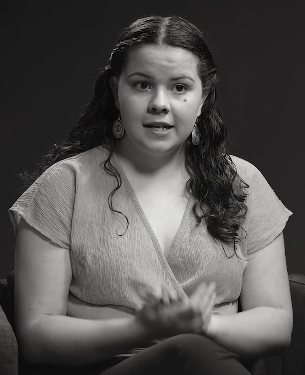
Jane T introduced Dhani Gilbert, an indigenous activist and 2018 Young Canberran Citizen of the Year, who was also more recently named the 2021 ACT Young Woman of the Year. She spoke on the significance of NAIDOC Week.
photo: 2020, HerCanberra
Dhani is a Kalari Wiradjuri woman from central New South Wales. In this part of the country the main river systems are the Lachlan [Kalari], the Macquarie [Wambuul], and the Murrumbidgee; and then further south, the Murray [Milawa]. Dhani spent her childhood living on these traditional lands, and at the Tent Embassy in Canberra. Both her parents are activists and Dhani considers she has activism in her DNA!
Dhani is currently studying at the ANU, in her second year of a double degree in Science and Environmental Sustainability. She is also undertaking a certificate course in Indigenous Culture and Language through Charles Sturt University in Wagga. In her spare time, she is the co-chair of the Aboriginal Youth Advisory Council in the ACT!
This year’s theme for NAIDOC is “Heal Country”. Dhani discussed First Nations ways of caring for country. Theirs are the best ways to manage the Australian landscape. Certain landscapes require particular inputs to thrive. The goal was to work within the landscape to maintain the ecology, especially the rich fauna. Dhani spoke of ‘cultural burning’ vs ‘hazard reduction’ and bushfire, as an example of traditional management of country. ‘Cultural burning’ is a ‘cool burn’ which preserves seeds, allows for green shoot regeneration and provides escape routes for animals. Bushfires are ‘hot burns’, destroying all before them and providing little means of escape for animals, and little feed for those animals which do survive. Like the land, Dhani noted that First Nations people have a lot of resilience.
Dhani spoke of ‘seven generations planning’ – important in today’s decision making, as decisions made today will impact seven generations down the line – good or bad.
In response to questions from the floor, Dhani addressed the issue of land and waterways management – crucial not just for the cities and towns, but also for farmers and rural and remote communities.
Dhani considered that there had been considerable mismanagement of the western river system. A river was much more than just the water between two banks, and the way the river system had been managed had completely destroyed the lagoon system.
Dhani discussed her Wiradjuri heritage, with particular reference to the Lachlan River and Lake Cowal, and spoke of her concerns about the siting of a large gold mine next to Lake Cowal; changes occurring in respect of the natural flood plain; and the diverting of river flows. She was also concerned about the agricultural use of the land and the large amounts of water being pumped from the river system, especially for growing cotton, prior to changes being made in relation to river flows.
Dhani raised ‘Cultural Flows’ particularly in the Murray Darling Basin and the adverse effect excessive water harvesting has had on a number of sites within the system which has limited natural flood events. This was especially in relation to the health of River Red Gums, which are suffering die-back because the river no longer floods. One only has to look at the river banks to see that the river used to flow at a much higher level.
Further discussion in respect of Dark Emu by Bruce Pascoe and The Biggest Estate on Earth by Bill Gammage ensued as did further discussion of hazard reduction vs cultural burning, and the Landcare movement.
Jane T. thanked Dhani for her very interesting and stimulating presentation.
